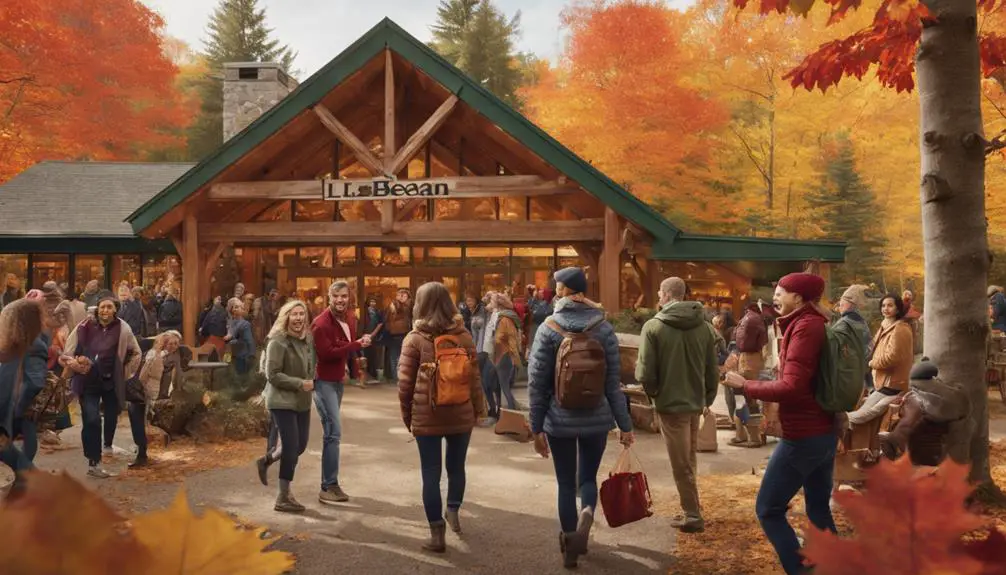L.L. Bean means quality outdoor gear and a legacy built by Leon Leonwood Bean since 1912. He started with waterproof hunting boots, and after overcoming early quality issues, he secured a loan to improve production. The brand opened its first store in Freeport, Maine, in 1917 and became known for its generous return policy, fostering customer loyalty. Over the years, L.L. Bean became synonymous with innovation, introducing products that meet outdoor enthusiasts' needs. With a commitment to inclusivity and sustainability, the brand continues to resonate today. There's so much more to explore about its impact and evolution.
Origins of L.L. Bean

L.L. Bean has its roots firmly planted in Freeport, Maine, where Leon Leonwood Bean founded the company in 1912. Initially, he focused on creating waterproof hunting boots designed to keep feet dry while out in the elements. However, these early boots faced significant quality issues, leading to a disappointing return rate. Most people wouldn't want soggy socks, after all!
To tackle this problem, Leon secured a $400 loan and partnered with the U.S. Rubber Company. This collaboration allowed him to improve the quality of the boots, ensuring they met the needs of outdoor enthusiasts. By 1917, just five years after the company's founding, L.L. Bean opened its first retail store in Freeport. This marked the beginning of its long-standing presence in the outdoor retail market.
L.L. Bean's commitment to quality and customer satisfaction became evident through its generous return policy. Customers were encouraged to bring back any product that didn't meet their expectations, which helped solidify a loyal customer base. This dedication to quality and service has been a cornerstone of the brand's identity ever since.
As you explore the origins of L.L. Bean, you can appreciate how a simple idea about waterproof hunting boots grew into a beloved company known for quality outdoor gear. The combination of innovation and a focus on customer satisfaction set the stage for L.L. Bean's lasting impact on the outdoor retail market.
Legacy of Quality and Innovation
The legacy of quality and innovation at L.L. Bean is a reflection of the brand's commitment to crafting durable products for outdoor activities. Founded in 1912, L.L. Bean introduced the Maine Hunting Shoe, an innovative design that combined leather and rubber, making it a reliable waterproof boot for adventurers.
Although the company faced significant early challenges, returning 90% of its initial boot production due to defects, it turned this around by focusing on quality and customer satisfaction. This dedication propelled L.L. Bean to reach $1 million in sales by 1946, even during the Great Depression.
Over the decades, the brand has evolved its logo and product offerings, reflecting changing consumer preferences and a commitment to quality, as demonstrated by their vintage identification practices. Innovation has been at the heart of L.L. Bean's offerings. In 1934, the company launched the hookless fastener Zipper Duffle, and in 1965, the iconic Norwegian Sweater hit the shelves, both designed to meet the evolving needs of customers. These products showcase L.L. Bean's knack for blending functionality with style.
Today, L.L. Bean continues to emphasize quality by sourcing materials globally while proudly maintaining a factory in Maine. Here, over 450 skilled workers engage in the craftsmanship of handmade products, ensuring that each item reflects the brand's high standards.
The focus on durable materials and thoughtful design reinforces L.L. Bean's reputation as a trusted name for outdoor enthusiasts. With each product, you can feel the legacy of quality and innovation that's been woven into the brand since its inception, making your adventures more enjoyable and worry-free.
Leadership and Management Evolution

Throughout its history, L.L. Bean has experienced significant leadership shifts that shaped its management style and core values. The journey began with the founder, Leon Leonwood Bean, who laid the groundwork for a family-run business. His grandson, Leon Gorman, took the helm in 1967 and guided the company until 2001, establishing a legacy of family leadership that embraced the company's values.
In 2001, Christopher McCormick became the first non-family CEO, marking a pivotal change towards external management. This shift was essential as it brought fresh perspectives while still prioritizing L.L. Bean's core values.
When Shawn Gorman was elected chairman in 2013, it highlighted the enduring influence of the family in leadership roles, even after Leon Gorman was named Chairman Emeritus.
The appointment of Stephen Smith as the fourth President and CEO in November 2015 signified another important change. He was the first external hire for this position, reflecting a strategic move towards modernizing the company's approach.
Under his leadership, L.L. Bean has placed a strong emphasis on corporate responsibility, urging inclusivity and community engagement. Management actively encourages consumers to embrace the brand, regardless of political affiliations, showcasing a commitment to social issues.
These evolutions in leadership and management at L.L. Bean show how a company can adapt while staying true to its foundational principles, ensuring a rich legacy continues into the future.
Commitment to Inclusivity
Increasingly, L.L. Bean is stepping up its commitment to inclusivity in outdoor activities. In 2020, the company launched a thorough Diversity, Equity, and Inclusion (DEI) plan designed to break down barriers for marginalized communities.
With a staggering $16 million dedicated to organizations that enhance outdoor accessibility and promote social justice, L.L. Bean is making a significant impact.
The brand understands that outdoor experiences should be open to everyone, and it actively supports initiatives like Outdoor Afro and Black People Hike. These organizations aim to create welcoming spaces for people of color, helping to foster a more diverse outdoor culture.
L.L. Bean's marketing strategies reflect a growing awareness of historical inequalities, ensuring that the narratives they promote resonate with a wider audience.
To further enhance diversity in its workforce, L.L. Bean set a goal to recruit 50% of its 2021 interns from underrepresented groups. This initiative not only enriches the company's culture but also paves the way for fresh perspectives that can shape future outdoor experiences.
Cultural Impact and Controversies

L.L. Bean has become a cultural icon in outdoor retail, but not without its share of controversies. In January 2017, the company faced calls for a boycott after Linda Bean, a member of the founding family, donated $60,000 to Donald Trump's campaign. This sparked public scrutiny about the company's political affiliations and caused many to question its values.
Despite the uproar, L.L. Bean reported that sales remained flat before and after the boycott, indicating that the controversy didn't considerably impact business performance.
To address concerns, L.L. Bean clarified that Linda's donations were personal and didn't reflect the company's stance, distancing itself from any political involvement. This strategy seemed to protect the brand's reputation as a trusted name in outdoor gear.
Beyond politics, L.L. Bean has been celebrated for its commitment to sustainability and environmental stewardship. The company actively promotes eco-friendly practices and contributes positively to conservation efforts, which resonates with many customers who value these principles.
Additionally, L.L. Bean's appearances in popular culture, like shows "Luke Cage" and "Unbreakable Kimmy Schmidt," have further enhanced its visibility and solidified its status as a cultural icon.
While political controversies may have momentarily shaken the brand, L.L. Bean's dedication to quality products and sustainable practices continues to draw loyal customers, proving that it stands the test of time in the ever-evolving outdoor retail landscape.





2 Comments